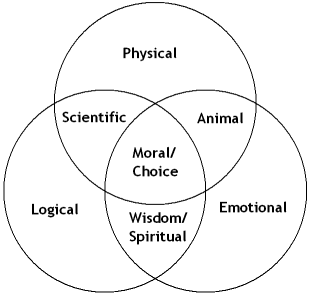There are three types of thing: physical, logical, and emotional.
There are three types of stuff: power, truth, and reasons.
There are three rule-sets: differentiation, interaction, and sequence.
There are three essences: What, How, and Why.
Nothing else can even be imagined by humans. Everything is constructed from these three.
I've always been fascinated with logic. I still remember reading about Boolean logic in a childrens' science encyclopedia, and thinking it was the most sublime thing ever. In high school, learning Pascal, and then C++, allowed me to interact with logic on a far deeper level than ever before. It was the perfect thing, the gorgeous and spiritual thing, the unsullied thing. I wanted everything to be as perfect as logic. But the people around me were illogical, and it turned out even I was illogical, ending up writing stories on my computer until all hours instead of doing my college classwork. It was as if my decisions had already been made for me, despite me wanting to do what was right. I fell out of college and landed a job as a dishwasher.
I applied my skills of logic to my own emotions, observing where they came from and what they made me do. I found interesting patterns, and found some solutions to my negative emotions. But one realization in late 2000 or early 2001 changed my life: logic and emotion are two entirely different types of things, in the same way the physical is completely different from logic. You can't freeze an equation into a plasma, or melt anger into a solid. They are made of different "stuff", to use a physical metaphor. And I couldn't think of any concept which didn't refer to something made of one of these three things: power, truth, or reasons.
I started applying this "three-thing" to everything I could think of, and found it was a key to understanding anything.
I applied the "three-thing" to the famous six questions of journalism, and they collapsed down to three categories:
-
"What happened?" Answered by a physical event, such as a wedding, or a car wreck.
-
"How did it happen?" This asks for the process, the logical interactions which led to the event.
-
"Why did it happen?" This asks for an emotional cause: "What was the motivation?" If it was an unmotivated event, in which something happened without someone deciding to do it, this is answered by the "how" above.
-
"When did it happen?" This is a specific place, which is a physical attribute.
-
"Where did it happen?" This is a specific time, which is also a physical attribute.
-
"Who was involved?" This asks for which person, answered by the physical fact of a specific person
-
"Who would do such a thing?" This is a completely different question which asks for an emotional answer, a variant of "Why?"
I could now logically determine what kind of answer is requested by any question.
I applied the "three-thing" to the cultural dichotomy of Man, and found a trichotomy instead:
-
Men are from Mars: men instinctively think in terms of concrete actions and choices, and see other people as physical beings. For men, the physical reality is the basic foundation of all.
-
Women are from Venus: women think in terms of changing impressions and reactions, and see other people as emotional beings. For women, the emotional reality is foundational, and the physical is an expression of that.
-
Aspies are from Vulcan: People on the autism spectrum, like me, instinctively reach for logic when we don't understand something or want to solve a problem. I yearned to meet more people like me, people focused on logic and thought, and I found them on the Internet. (Oh, how the times have changed...) For me, logic and truth are the foundation.
I now had a basic map for dealing with people.
I applied the "three-thing" to ontology, the study of what types of things exist.
I asked myself what the difference was between being "right" in the sense of having the correct answer and being "right" as in choosing morally. I realized I already had a built-in map in my mind of the opposites of things: right/wrong, correct/incorrect, and so on, but I had simply not sought to articulate or formalize it before:
-
Moral: right/wrong
-
Logical: true/false
-
Philosophical: wise/foolish
-
Physical: changing/static
-
Scientific: accurate/inaccurate
-
Emotional: good/bad
-
Psychological: thriving/perishing
I have since applied this to other philosophies, to value systems and economics, to psychology and the editing of the subconscious, to physics, to political tribalism and the Libertarian view of taxation, to Trinitarian theology, to music theory, and even (after watching Pixar's Ratatouille) to food theory. In each case, I've found answers readily available through Triessential analysis. I've seen rhetorical triads in anything about which people speak rhetorically, and they're usually Triessential. I have come to believe that this three-way categorization is how the human brain recognizes and categorizes the world, subconsciously or consciously.
I've seen books written with Triessential underpinnings, such as Arnold Kling's "The Three Languages of Politics" focusing on their differences and reconciliation, and Simon Sinek's "Start With Why" focusing on the sequential nature of motivation. I've seen how Triessentialism is the answer to Objectivism's missteps, and accounts for postmodernism's criticisms of modernism in meaningful ways. I've even seen it explain the rise of drag queen story hour at libraries.
Now I want to start producing content based on Triessentialism. I want to write a book, start a podcast, generate a wiki, do something to get this worldview out there and being talked about. I also want to talk about these concepts in a place I can refer back to, and analyze new things I haven't yet applied it to. So I finally made this post, partly to organize my own thoughts and brainstorm, but also to get reactions from smart and interesting people.
Ask me to elaborate on anything, or to analyze anything. Ask me to react to something. I'll do my best to apply Triessentialism so you can see how it functions.



Jump in the discussion.
No email address required.
Notes -
I just stumbled on this thread. It has been a year. I too am interested in your responses to the other questions. The combination of pedophilia and fascism is something I’ve never ever seen before on the internet.
More options
Context Copy link